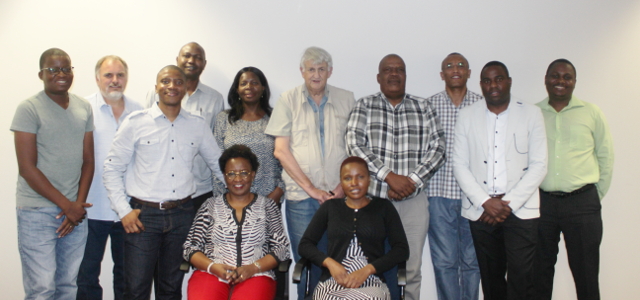Speaking during the GWP-SA / Regional Technical Committee (RTEC) Programme Meeting, Mr Simalabwi said that GWP-SA’s Work Programme is anchored in the framework of GWP Strategy Towards 2020, whose three strategic goals are catalysing change in policies and practice; generating and communicating knowledge; and strengthening partnerships.
“It is imperative that we have the right expertise to provide technical leadership to our ongoing Regional Integrated Water Resources Management (IWRM) programme. It is, therefore, against this background that the board appointed a Special Advisor, Gender Expert and a 5 – member RTEC team to support the GWP-SA Secretariat in implementing its programmes focused on water security, industrialization, job creation and climate resilient development in the region.
As an official and integral governance structure of GWP-SA, the RTEC works in conjunction with the GWP Reference Group of experts, which provides technical support to the GWP Africa Coordination Unit hosted by GWP-SA Secretariat. Individually and collectively the RTEC works closely with respective thematic leads and is involved in the core strategy development, and technical oversight in GWP-SA programmes.
Reporting to the Regional Board (through the Regional Executive Secretary), the RTEC serves to:
- Enhance the technical capacity of the GWP-SA Secretariat to deliver effectively on the GWP-SA work programmes developed for the GWP-SA strategies. This includes technically enhanced and sound proposal development, assistance in developing TORs and technical review support
- Provide technical advice to the GWP-SA Board
- Identify and develop the necessary associated programmes and proposals, at the same time keeping abreast of technical and technological developments for the Partnership and to strategically influence programme development.
- Be a regional technical resource that can be called upon to support both the regional and country programmes.
The joint programme meeting was held at GWP-SA offices in Pretoria, South Africa from 29 November 2017 to 1 December 2017. It was attended by the GWP-SA programmes team, RTEC, Gender Expert and Special Advisor as well as GWP-SA Country Water Partnership technical advisors. Convened by GWP-SA to introduce GWP to RTEC, the meeting also sought to acquaint RTEC members with their tasks and expected deliverables as well as present the proposed Africa Investment Programme on Water and Jobs. In addition, the meeting served to discuss the SADC Industrialisation Agenda & AU Agenda 2063 and introduce the RTEC to GWP-SA/Africa work programme, which is composed of the following:
1) Water, Climate and Development Programme (WACDEP)- was piloted and implemented in Africa by GWP-SA on behalf of the African Ministers' Council on Water (AMCOW). The programme aims to integrate water security and climate resilience in development planning processes, build climate resilience, and support countries to adapt to a new climate regime through increased investments in water security. Through its eight work packages, the programme makes interventions from regional down to community levels. These interventions include supporting governments in the development of related to water and climate change. The programme now has a geographical presence in 60 countries across four continents.
2) The EU Water-Energy-Food Nexus Dialogue Programme- is a European Union initiative being implemented in Southern Africa by GWP-SA on behalf of the SADC Secretariat. Dwelling on the interdependence of water, energy and food, the programme is there to support Regional Economic Communities (RECs) and their member states to meet water, energy and food security simultaneously reducing investment costs while at the same time maximising resource utilisation. In the process, the programme seeks to foster regional value chains and support in creating and sustaining jobs – through building synergies and integrated planning.
3)Transboundary Water, Gender, and Environment Programme – The programme focusses on improving the implementation of selected harmonised strategies and policies on transboundary water cooperation in the SADC region. The current project portfolio is composed of the SADC-GiZ Transboundary Water focusing on Stakeholder Engagement; Strengthening Gender Mainstreaming; Regional Knowledge Management as well as Monitoring and Reporting on the implementation of the SADC Regional Strategic Action Plan (RSAP) IV on Integrated Water Resources Management. Support is also being provided to River Basin Organisations such as the Zambezi Watercourse Commission (ZAMCOM), The Orange-Senqu River Commission (ORASECOM), Limpopo Watercourse Commission (LIMCOM) and Buzi- Pungwe-Save (BUPUSA).
4) Integrated Urban Water Management (IUWM), Jobs, Youth and SDGs - The Programme’s emphasis is on promoting integrated urban water and sanitation investment for resilient cities in Africa. It focuses on supporting governments to create jobs through increased investments in water infrastructure and industrialisation for inclusive economic growth and sustainable development.
The joint meeting also deliberated on the proposed Africa Investment Programme on water and Jobs.
